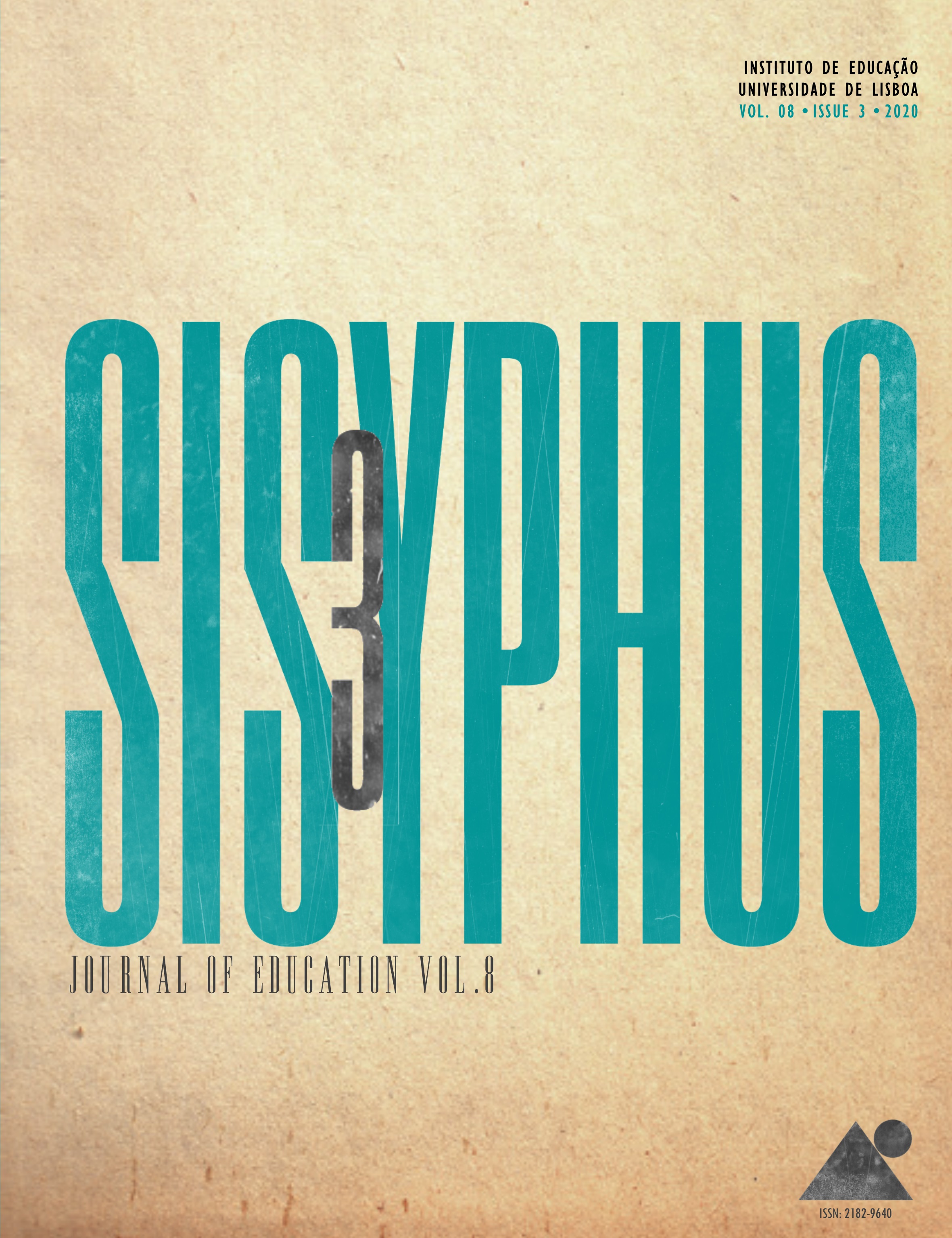Solidaridad Ecológica Y Educación Popular
DOI:
https://doi.org/10.25749/sis.19952Palabras clave:
ecofeminismo, humanización, emancipación, solidaridadResumen
Este texto comienza con la afirmación de que debemos escuchar a la naturaleza y reconocer la interconexión de todos los seres vivos. Esbozo tres principios centrales para un enfoque freireano en la educación popular: propósito político y prejuicio del educador; el diálogo como proceso epistemológico y ontológico; y la "vocación" de humanización. Usando una lente ecofeminista, sugiero que la solidaridad ecológica: ser parte de la naturaleza, en lugar de estar separada de ella, debe ser una parte crucial de cualquier educación en el futuro. Esto me lleva a alejar la noción de emancipación de la libertad individual y personal hacia una adopción práctica de la interdependencia y la interrelación, tal como se inscribe en el significado original de “Ubuntu”.
Descargas
Citas
ABULHAWA, S. (2017). Before the last river. In V. PRASHAD (Ed.), Will the flower slip through the asphalt. Writers respond to Capitalist Climate Change (pp. 100-111). New Delhi: New Left Words.
BURT, J., & LUSIKI, T. (2017). Being the Earth’s Comrade: Research for the People, by the People. In A. VON KOTZE & S. WALTERS (Eds.), Forging Solidarity: Popular Education at Work (pp. 105-117). Rotterdam: SENSE Publishers.
BUTTERWORTH, S., & WALTERS, S. (2017). Moves to decolonise solidarity through feminist popular education. In A. VON KOTZE & S. WALTERS (Eds.), Forging Solidarity: Popular Education at Work (pp. 27-39). Rotterdam: SENSE Publishers.
CESAIRE, A. (1972 [1955]). Discourse on colonialism. This version published by Monthly Review Press: New York and London, 1972. Originally published as Discours sur le colonialisme by Editions Presence Africaine, 1955.
COPAC – CO-OPERATIVE AND POLICY ALTERNATIVE CENTRE. (2019). Climate Justice Charter. Personal communication 10 January 2020.
DAVIS, M. (2020). In a plague year. Retrieved from: https://jacobinmag.com/2020/03/mike-davis-coronavirus-outbreak-capitalism-left-international-solidarity
FANON, F. (1970). Black skin, White masks. Frogmore & St Albans: Paladin.
FREIRE, P. (1972). Pedagogy of the Oppressed. Harmondsworth: Penguin.
FREIRE, P. (2000). Pedagogy of Indignation. Oxon: Routledge.
FREIRE, P., & MACEDO, D. (1995). A Dialogue: Culture, Language and Race. Harvard Educational Review, 65(3, Fall), 377-402.
FREIRE, P., & SHOR, I. (1987). A pedagogy for liberation. Dialogues on transforming education. New York: Bergen & Garvey.
GAZTAMBIDE-FERNANDEZ, R. A. (2012). Decolonization and the pedagogy of solidarity. Decolonization: Indigeneity, Education, & Society, 1(1), 41-67.
GIROUX, H. A. (2010, November 23). Lessons to be learned from Paulo Freire as education is being taken over by the mega rich. Truthout. Retrieved from: https://truthout.org/articles/lessons-to-be-learned-from-paulo-freire-as-education-is-being-taken-over-by-the-mega-rich/
GOSH, A. (2016). The Great Derangement. Climate Change and the Unthinkable. Gurgaon: Penguin Books.
GORZ, A. (1999). Reclaiming work. Beyond the wage-based Society. Cambridge: Polity Press.
GRIEVES, G., & CLARK, M. (2015). Decolonising solidarity. Overland. Retrieved from: https://overland.org.au/2015/09/decolonising-solidarity.
HOOKS, b. (2003). Teaching community. A pedagogy of hope. New York & London Routledge.
HORTON, M., & FREIRE, P. (1990). We make the road by walking. Conversations on education and social change. Philadelphia: Temple University Press.
KAHN, R. (2003). Paulo Freire and eco-justice: Updating Pedagogy of the Oppressed for the age of ecological calamity. Retrieved from: https://www.researchgate.net/publication/240595300_Paulo_Freire_and_eco-justice_Updating_Pedagogy_of_the_Oppressed_for_the_age_of_ecological_calamity
KLEIN, N. (2017). Let them drown. The violence of othering in a warming world. In V. PRASHAD (Ed.), Will the flower slip through the asphalt. Writers respond to Capitalist Climate Change (pp. 29-50). New Delhi: New Left Words.
KROG, A. (2020). FW de Klerk never had any moral intention, and he left us behind as white kansvatters. Retrieved from: https://m.news24.com/Analysis/antjie-krog-fw-de-klerk-never-had-any-moral-intention-and-he-left-us-behind-as-kansvatters-20200220?fbclid=IwAR3yBzlmGW1fVrH41fpb5aVk22aEVsHJCFpP0UfbmrymrNSAXz_1xD6yALs
MBEMBE, A. (2015). Decolonising knowledge and the question of the archive. Retrieved from:https://wiser.wits.ac.za/system/files/Achille%20Mbembe%20-%20Decolonizing%20Knowledge%20and%20the%20Question%20of%20the%20Archive.pdf
MELWA, K. (2019, September 30). Sleepwalking our way to extinction: the climate crisis must be made part of our national conversations. Daily Maverick. Retrieved from: https://www.dailymaverick.co.za/opinionista/2019-09-30-sleepwalking-our-way-to-extinction-the-climate-crisis-must-be-made-part-of-our-national-conversation/
MIES, M., & SHIVA, V. (2014). Ecofeminism. London & New York: Zed Books.
SALLEH, A. (2017). Ecofeminism as politics. Nature, Marx and the Postmodern. London: Zed Books.
THOMPSON, J. (2000). Emancipatory Learning. NIACE Library and Information Service. Retrieved from: http://www.aughty.org/pdf/emancipatory_learning.pdf
VON KOTZE, A. (1987). Theatre against Apartheid. New Left Review, May/June, 83-93.
VON KOTZE, A. (1988). Organise and Act. History of the Natal Workers Theatre Movement 1983-87. Durban: Culture and Working Life Publications.
VON KOTZE, A. (2020). Plays as education – producing useful knowledge for/with precarious workers. In L. COOPER & S. HAMILTON (Eds.), Renewing Workers’ education (pp. 161-180). Johannesburg: HSRC Press.
Descargas
Publicado
Número
Sección
Licencia
Copyright (c) es propiedad de Sisyphus – Journal of Education. Sin embargo, alentamos que los artículos publicados en la revista se publiquen en otro lugar, siempre que se solicite el permiso de Sisyphus y los autores incorporen nuestra cita original y un enlace a nuestra página web.
Política de Autoarchivo
Los autores pueden autoarchivar la versión final publicada de sus artículos en repositorios institucionales, temáticos o páginas web personales e institucionales.
Suscriptor de DORA
El Instituto de Educação de la Universidade de Lisboa, editor de Sisyphus, es uno de los suscriptores de la Declaración de San Francisco sobre la Evaluación de la Investigación (DORA).





